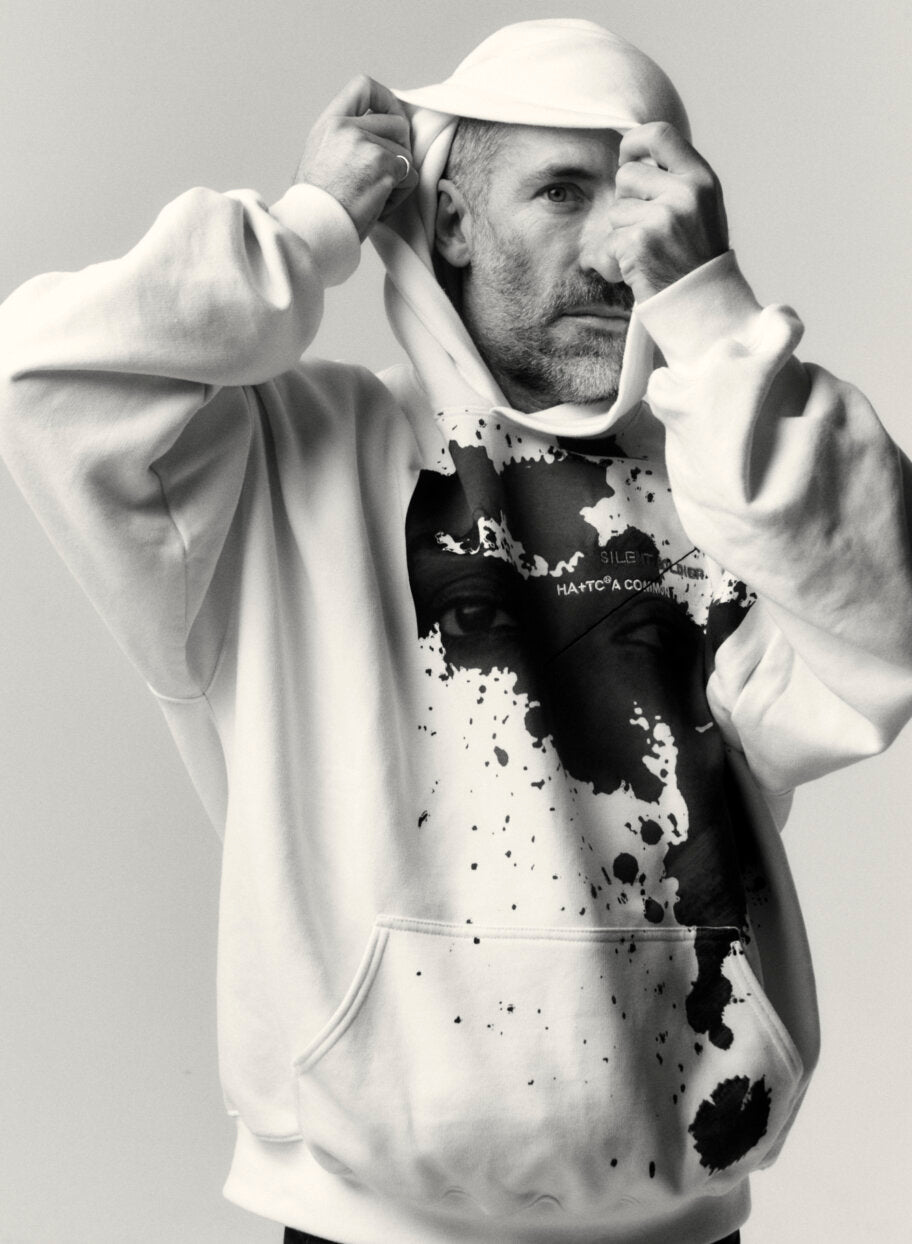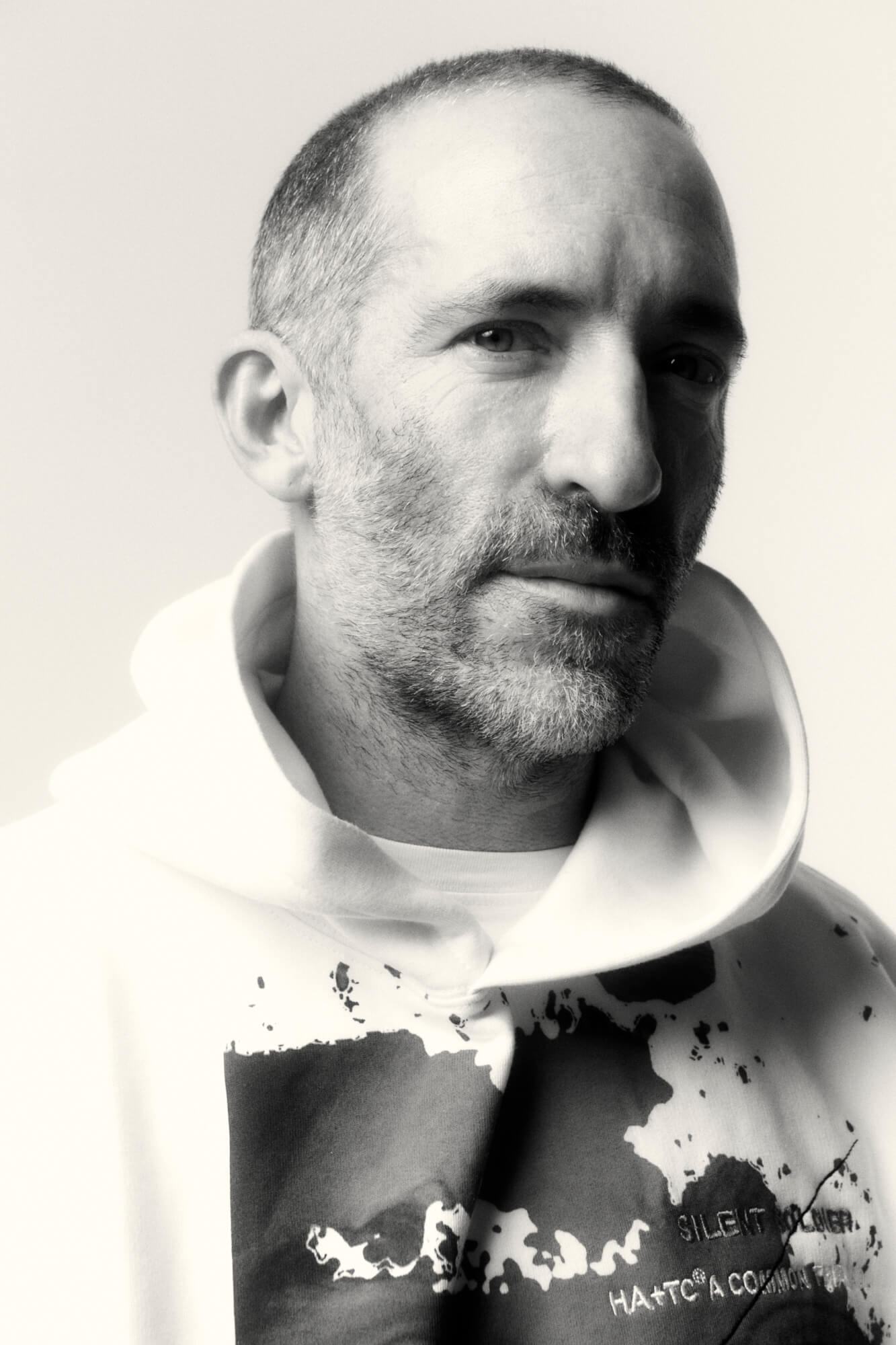
Rudi Lewis is a rebel at heart
Checking in with yourself is crucial. It’s a lesson learned the hard way by hairstylist Rudi Lewis, who shares here how he has reconnected with his roots after finding himself momentarily lost in the glamour of it all. The industry can be a beast, and making sure you’re staying true to yourself and your own unique voice can be quite the journey. Read along as Rudi shares how he got to where he is today – and touches on the bumps along the road.
PHOTOGRAPHY ROBIN GALIEGUE @robingaliegue @mapltd
INTERVIEW KIRSTINE ENGELL @kirstineengell
When you first started out, how did you stay confident with your work and the direction it was taking you?
As a youth, I don’t think I ever really knew too much about the fashion world, I was coming from a place of being into certain bands and I knew what I thought looked cool. It’s important to remember that magazines then weren’t dominated by fashion in the way they are today. There wasn’t any social media obviously, so if you wanted to keep up with the latest sounds and who was cool or whatever, you’d look in i-D or The Face, which were really more about style and music as much as they were about fashion, but equally I was reading NME and Melody Maker and the music press. To my mind, fashion magazines were very much for rich, white, middle class women, not kids from council estates like me. I just knew how I wanted to look, how I wanted hair to look, I was always very confident about that.
Is there something particular that represents your work aesthetically and has that changed throughout your career?
I’d say my work is very rooted in British subculture, and has closely followed my own journey, through the Mod, ska, punk scene as a kid, through indie music and then the acid house and rave scenes in the 90’s and 00’s. I think around 2010 or so, I began to find myself working for glossy magazines, and I became more ”successful“. I think I felt I had to adapt to that aesthetic, so my work became more refined, and high end, but also more commercial. I think I was a bit lost in that world, you know, it wasn’t authentic to me, I didn’t belong there. Working class impostor syndrome. I could do the hair, but I guess my heart and soul has always been in the counterculture. The last few years, for me, have been about listening to that voice a bit more.
It’s a highly competitive industry. What would you say are the key values that have sustained you?
Yeah, it’s a very unhealthy industry. I definitely got lost along the way, I bought into it…all that energy I wasted feeling envious of others people’s success, or going into projects with people you knew to be toxic, just because it was a big name brand, or a top photographer or whatever… I have always been quite outspoken, which isn’t always appreciated in this industry, it makes people uncomfortable when you question things. I dunno, I can’t really help it. I’m unsure what my key values would be, other than stay true to who you are and what your thing is….and, you know, try not to be a cunt.

“My work became more refined, and high end, but also more commercial. I think I was a bit lost in that world, you know, it wasn’t authentic to me, I didn’t belong there. Working class impostor syndrome. I could do the hair, but I guess my heart and soul has always been in the counterculture. The last few years, for me, have been about listening to that voice a bit more.”
Do you sense a growth in the importance of community and cohesion among the session hair stylists around the world?
I don’t know, I think social media enables us to communicate with each other more easily, and I definitely have DM chats with other hairstylists, and young hairdressers who reach out for help or advice. So, that’s good I suppose. I think under the pandemic it became the only way to belong, since you couldn’t be out in the world. But, I worry about the definition of ‘community’ when we live in this increasingly atomised way. We scroll, and like and follow and unfollow and I don’t really know if that qualifies as cohesion. I really admire people who go out and actually build connections for real, like Joshua Coombes, cutting hair for free on homeless people, and using his platform to humanise these people that society has forgotten. It’s been inspiring to see how moved people have been to raise money for Ukrainians affected by the war, but then I find there’s often a deafening silence when I mention Palestine to the same people. I’m a bit of a cynic, can you tell?
If you’d have to share something you truly stand by and want to pass on to the new generation of budding hairstylists, what would it be?
Your voice is most clear when it comes from a place of authenticity.
These days, society and social media can make a lot of us feel like we’re expected to live up to an impossible self-image. How do you think social media has affected our societal ideals of beauty?
Wow, I could write a book… On the one hand, people who feel marginalized from mainstream beauty ideals feel like there’s a space to be visible, so that’s good, but, on the other hand i think it also compounds negative body issues. I look at my 10 year old daughter and her friends and these anxieties are already affecting them deeply, and it is only getting worse. I think this endless need to expose ourselves to everyone all the time is really unhealthy. It’s quite narcotic really, we know it’s bad for us, but we can’t stop doing it. We follow these celebrities and influencers, and their endless self promotion. Their clothes, their hair, their make up is copied by some of their followers, which means that their aesthetic bleeds out into society. So then we end up with these sort of algorithmic aesthetics dictating beauty and fashion that are just coming from an empty pursuit of likes and cyber adulation. There’s so little soul in any of it, that’s my problem with it.
How do you keep calm and recharge your batteries in a busy work world?
Haha, well, i’m constantly battling with myself to not spend hours scrolling instagram for a start! I’m trying to read more, pick up the guitar more, anything to not scroll… When I’m not working, I’m just happy to be at home in Sweden with my partner, kids and our massive dog, Barney. He needs a couple of hours of exercise daily, so that means I’m outdoors a lot. I have a little studio close to home, and I’m often working on personal projects, photography and hair.
“I have always been quite outspoken, which isn’t always appreciated in this industry, it makes people uncomfortable when you question things. I dunno, I can’t really help it.” –
Rudi Lewis
Are you conscious of creating a sustainable environment on set when you can?
Our industry is inherently unsustainable, we are selling people stuff they don’t truly need, so i find it deeply hypocritical when fashion people start lecturing on sustainability…with that said, accepting that we are working in this industry, i am glad that the conversation is happening, and that some people are trying to make changes. But, I literally fly around the world to do people’s hair, so the guilt is overwhelming…i think that’s the real issue here, not whether my hairspray is environmentally friendly or not.
Do you sense that there are changes on the way in terms of sustainable hair products?
I really hope so…i more or less do my entire range of work with 5 or 6 key products, and i’d be happy to switch them out if i found a viable alternative, but i haven’t yet. I’ve tried quite a few organic products, but they never do what I need them to do.
With all that you’ve accomplished throughout your career, how would you like to be remembered?
He did some cool hair, and wasn’t a terrible person. RIP.
@RUDILEWIS @LGAMANAGEMENTBEAUTY
